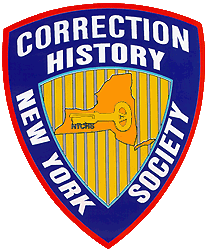Greetings,
My father, Al Margolis, worked for the DOC for more than 40 years, from about 1929 to
1973 or thereabout. When he retired, he was the director of fiscal control.
He worked under a number of commissioners but the only one whose name
I recall is Anna M. Kross.
Perhaps I will be able to resurrect an
unforgettable Christmas photo which is especially grim. It is of him
and Mrs. Kross at what might be a holiday party. There on a desk is the
tiniest of tiny Christmas trees. There at the desk are -- looking about as stern
and dispassionate as possible -- the Commissioner and Dad,
his J. Edgar Hoover vaseline hair slicked down.
I
regret to say the memory of that "office holiday photo" stayed with me a long time as a warning of what a
lifetime in corrections and prison life, no matter which side of the
bars, might do to a person.
Not all the memories are as grim.
XXX
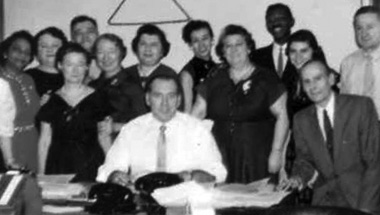
Image above & text below provided by Al's daughter Maida. |
|
Hi,
Attached find two pictures of my father at his DOC desk.
In the back of both DOC office pictures that I scanned are the words "week of Jan. 11 - 58." The two pictures were taken at his office on 100 Centre St., Manhattan, on the 15th Floor.
Being not quite 10 at the time, I do not have any idea of the identity of any of the people in the photographs (besides my father). From the decorations in the backgrounds, I would deduce that these pictures were taken the previous month at a holiday party.
Al was born, Oct. 9, 1909, so in those two pictures he was 48. His retirement date is January, 1972, and I believe that his final title was Director of Fiscal Control. Al died from a heart attack February, 1979. At that time, he had moved to Tamarac in the Fort Lauderdale area of Florida.
As a side note, our father began calling himself "Al" when he started work at the Department of Correction in 1929. As the child of immigrants, he wanted to seem more "American" when he went to work for the City. Similarly, it is not surprising to know that he did not speak English until he started attending elementary school.
His parents, Becky and Benjamin, realizing the precarious condition for a young Jews, emigrate to the United States in 1905, shortly after the outbreak of the Russo-Japanese War. Al's older brother, Moishe, or "Moe" as we knew him, was born in 1906, and would also work for the City of New York. Moe, a chemist, works on the Manhattan Project, but will spend the bulk of his career testing materials for the NYC subway system.
...
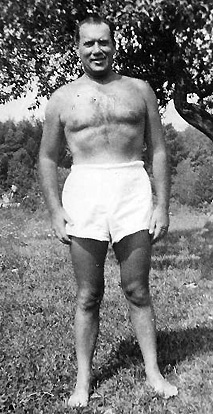
My dad, "Al," an avid swimmer. In Catskills, circa 1950s.
|
| In other trivia, Al learned to swim in elementary school, as part of a Friday program, in the same program that spawned Johnny Weismuller, an Olympic swimmer who would play Tarzan opposite to Maureen O'Sullivan, Mia Farrow's mother. In the same vein, our mother Americanized her name too -- from Bella to Belle.
Also in an earlier email, my brother mentioned the difference in civil servant pay brought on by events and programs in the 1960s -- the redistricting of state legislatures and Great Society programs. I was in high school at this time, so I was not really part of the discussion -- but an avid listener,-- the family talk did concern a special pay raise and rank for my father.
The questions that arose by this time concerned whether my father's duties were more clerical or more administrative (since his responsibilities included being in charge of several people's duties), and whether he need to take a special civil service exam to earn this higher pay rank.
As I had mentioned earlier, by the 1950s this class of employees like my father had created a cadre of leaders that had the effect of establishing a well-run organization. So what I gathered happened -- deducing again -- the union(?) in presenting its case argued that these employees deserved higher pay without taking a special test because of their duties and responsibilities.
I gather as well, that my father was used as an example because he so exemplified the administrative role. Perhaps this was the impetus for the article that I referred to earlier. Again, from the 1958 pictures, he obviously looks like a "boss," as he is the center of the picture with focus toward him. Similarly when I worked there the summers of '67 and '68, I am treated with deference coming from his rank.
Our father represents that statistic where the Depression had young people delaying marriage and family. I was born in '48 as part of the post-war boom. However, our father being on the cusp of age, coupled with a handball injury (broken arm) that didn't or wasn't set correctly, did not serve in World War II. I know he belonged to the Knights of Pythias, and I know he kept up with college fraternity buddies among who was Alfred Sheinwold, the bridge guru, but I can't recall other groups.
The only other memory that might prove interesting regards lunch. As I mentioned in an earlier message, during my college years, for two summers I worked at the Dept. of Correction -- 14th floor for the Statistics Division. Employees could eat lunch for 32 cents in a special part of the prison cafeteria. However, my father, as an administrator, had access to a more select room where the food and service were more akin to a restaurant. In each of the summers, my father took me for lunch one time in that facility, and that meal was always very special and exceptionally tasty, obviously cooked with more care than the cafeteria fare. There was also some mural adorning the walls of that area which drew a great deal of interest, however, I don't remember any more.
Thanks for the interest in our father. Thanks for awakening all these memories. I hope they proved useful.
Maida Buckley.
|
|
Image below & text above provided by Al's daughter Maida.
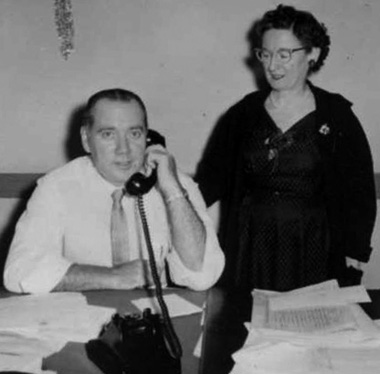
XXX |
|
On numerous occasions
I met with my dad in the Tombs' Officers Dining Room. When he would
travel to the prison farms upstate [New Hampton and Graycourt], I felt lucky to journey out of the
city and into the countryside with him. These lunches and excursions
acquainted me, if ever so slightly with prison life.
Dad did good,
for I have always made it a point to be on the right side of the law.
I know he gave yeoman's service to the department. He deserves
recognition.
It was a different era when I as a 7th grader would take the subway
down to Canal Street and rendezvous with my Dad. It was his purpose
to take me shopping for clothes on Delancey Street and while we were
at it he would treat me to lunch in the Tombs Officer's Mess.
I vaguely
remember there were murals on the walls and that the warden [Harry Silberglitt] had a Ph'D
in Criminology.
One of the fellow workers was Ruby Tuchman [Department Administrator Reuben Tuchman]. I recall
a lunch, I had done this a few times, where they were talking about
the quality of chefs or cooks. It seems that they could depend on
having inmates who had quite a background in what might be called
today culinary arts.
That would lead to a discussion of other notable
residents and I distinctly remember being there coincidental with
Norman Mailer's incarceration. Much of their conversation with me at
those lunches revolved around the purposes of incarceration,
rehabilitation and recidivism.
They were frustrated by the rate of
recidivism and were bent on promoting a humane penal system.
It surprises me to pull this out of my mind at this moment because
what I often remember was the slow movement through the institution as
one set of iron gates led to another.
In trips to the upstate correctional farms we always came away
fascinated that the farms purified their waste water so that it was
used for irrigation and was actually potable -- if you dared to drink
it.
Dad would invariably come home with a flat of farm fresh eggs.
I
had the ability to walk around through some corridors and remember
once being mistaken, by some group of individuals, for a prisoner
because I was wearing a white shirt and tan chinos. Little did I know
that my father's choice of clothes for me did not depart very far from
typical simple prison wear. This provided another instance of being
sure that I for one was not going to land behind bars.
Dad served under many Commissioners and I can recall his
conversations at our dinner table about their earnestness and their
naivete. It was men like him, Ruby and the warden, "lifers" who kept
the department running smoothly.
I remember a Civil Service newspaper
that referred to both Al Margolis and his brother Moe who was a
metallurgical engineer with the Transportation system as being part of
a cadre of major bureaucrats who kept the city running.
Al and Moe were handball sharks. They in their youth reportedly won weekends playing handball in the Catskills. Early on Sunday mornings I used to go to the Park on E.18th St and Ave. L with Dad and watch the men play handball. Handball was and continues to this day to be THE New York City sport.
Those men played hard . When they took their serves, it sounded like a gunshot coming off the wall. The court was yours as long as you could hold it and you took on all comers. Dad's shirt and trunks would be drenched with sweat.
XXX
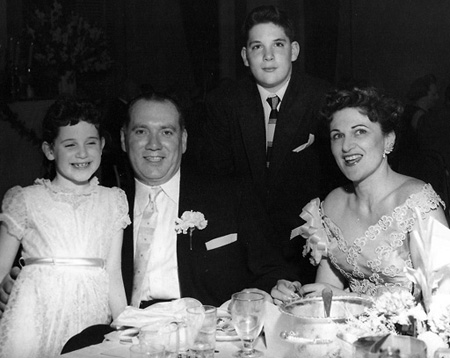
XXX
|
|
Maida, Al, Jeff & Belle celebrate Jeff's Bar Mitzvah in 1956.
|
|
Dad and I had some major differences that hurt each of us very
deeply.During the Vietnam War, I was an anti-war activist and it was
his business to set up detention facilities capable of housing
thousands of detainees. . . . .
There I was at
loggerheads with Al, the protector of the Establishment. It took us
years to regain respect for each other. I didn't see him for years . . . .
Dad used to work nights at AS Beck Shoes. A civil service job didn't
pay enough. It wasn't until the Supreme Court decision of Baker v.
Carr that legislatures were reapportioned and gave representation to
urban populations that money began flowing into the cities. Thus, with
the advent of the New Frontier and Great Society, money began to flow
in and Dad's salary could get us through.
He used to tell us about how on occasion he would be placed in a "line-up" as a "filler" and
sometimes even be misidentified as being the "perp." That gave us all
food for thought: how people are able to misconstrue what they saw.
|
Below is a list of DOC Commissioners under whom "Al" Margolis served during 40+ years with the agency.
|
XXX

Richard
C.
Patterson
8/15/27
--
9/30/32
XXX

Robert
L.
Tudor
10/l/32
--
5/25/33
XXX
William
J.
Cahill
5/26/33
--
10/6/33
XXX
Wilbur T. Wright
11/28/33
--
12/31/33
XXX

Austin
H.
MacCormick
1/l/34
--
1/15/40
XXX

Col. David
"Mickey"
Marcus
1/16/40
--
10/15/40
XXX

Doctor
Peter
F.
Amoroso
10/16/40
--
12/27/46
XXX

Albert
Williams
12/27/46
--
12/31/53
XXX

Anna
M.
Kross
1/l/54
--
3/30/66
XXX

George
F.
McGrath
3/31/66
--
1/23/72
XXX

Benjamin
Malcolm
1/24/72
--
11/77
XXX

Joseph
D'Elia
(Interim)
11/77
--
1/8/78
XXX
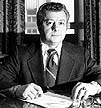
William
Ciuros
1/9/78
--
8/12/79
XXX
|
|
Misconstruing what we look at doesn't happen just during police line-ups of strangers; it can happen even within family.
In retrospect, I recognize now, whatever my differences with my father, no STRAIGHTER
ARROW was ever fired. He was as honest, thoughtful, realistic,
practical and as loyal as they come.
I worked for five summers with the
Department of Parks as a lifeguard in Coney Island and sustained a
couple of serious injuries. Dad wouldn't consider making a case
against the City even though there was clear negligence on the part of
that municipal agency.
XXX
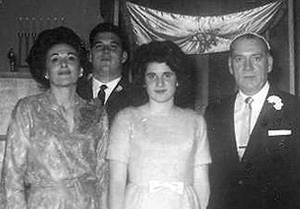
XXX
|
|
Belle, Jeff, Maida & Al at Jeff's wedding in 1962. The chupeh can be seen in background.
|
|
My parents provided excellent educations for both of their
children. I received my BA in Liberal Arts from Michigan State
University. My sister Maida has been an educator her entire adult life and, at the University of Alaska,
currently teaches teachers how to teach.
The both of us strayed as far from the Big Apple as one could possibly
get. I married in my senior year and recently celebrated our
47th Anniversary. So, as my mother used to say, "We had a marriage
made in heaven."
Shortly after graduation I took a civil service job
with the Michigan State Bureau of Social Aid. I stayed there for a
year and that proved to be my first, last and only job. After
observing my dad's 9-to-5 lifestyle I was determined not to let that
happen to me. Now I happily work from dawn 'til dusk.
Rarely is my
work day less than 11 hours, but I pace myself. I live in a rural
area and I wander from my store to my garden or orchard and do what I
please when I please, except I am swamped all the time with either my
business or my commitment to civic affairs and our community here in Van Zandt, Washington State.
Although
my folks looked upon me as a hell-raiser as a youth, it was all a
manifestation of civic involvement. I've spent over a decade on our
Van Zandt fire department and I have been on the boards of numerous cultural
organizations, environmental groups and county committees.
XXX
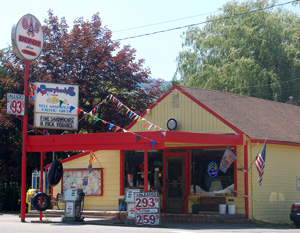
XXX
|
|
Everybody's Store, Van Zandt. Click for website.
|
|
But mostly
our life is about Everybody's Store in Van Zandt, Washington State, which we
started in 1970. We are pioneers in the organic and natural food
industry. When we came out here, it was the tail end of the frontier.
Following my stint as a social worker I got my MA in political
science and then went on for the Ph'd,. The Masters program was far
more rewarding and I wrote my dissertation about Mass Society. I did
my Ph'd work in constitutional law and political theory.
But between
my civil rights and meshugeh or cockamamie anti-war activity in the
early Vietnam War years, I didn't gain the respect of either my father or
the UMass poli sci faculty. After passing my Comprehensive Exams, I
literally drifted off into the sunset. By this time, my daughter was
six and we were "the voluntary poor" or what is now known as homeless,
living in a milk truck (a modern day Conestoga wagon), that we had
driven from Amherst to the Pacific Northwest.
Living on the edge of
the knife of economic necessity and longing for a house in the
country, we found a store with a house in the country and bought in
with a few years of my wife's teaching retirement money and a few
hundred bucks from a friend here and there.
XXX

XXX
|
|
Mt. Baker, a main outdoors activity attraction in Van Zandt vicinity. Click for tourist bureau website.
|
|
Throughout my adolescence in Brooklyn I worked at the corner drug
store and similarly I would work nights in a jewelry store and
weekends at sporting events while an undergraduate. My dad worked
nights, retail, as a shoe man, so it was no big deal for me to take on
a retail enterprise in the middle of nowhere.
Of course I was a
complete outsider and on the first day of business I was informed, via a message scrawled in
manure on the front wall that
I was a "---- Hippie"!
Well, there we were starting at the one
yard line, living on a shoe string, a 1000 bucks worth of merchandise
and a 600 square foot grocery store.
Eight years later Al visited us in Van Zandt. He realized that I was
indeed a very busy and serious man. He really enjoyed shooting my
guns in the "back 40." Old grudges were dropped.
Not long after, he died.
So this is kind of a bitter sweet story.
It took me a while to grow up
and realize how much my dad gave me in terms of working so hard to
provide so much for us. Even more important were the habits and
character traits that he displayed and left for me to emulate. Like
working for 42 years.
XXX
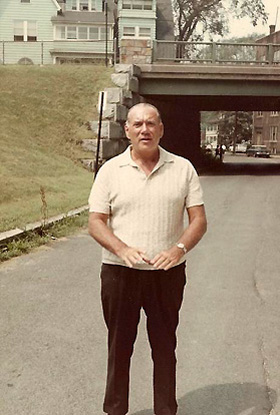
XXX
|
|
Al in North Hampton, Ma. in 1969.
|
|
In the DOC he was an accountant which I thought
was the last thing in the world that I would ever want to be. Today
accounting is the "CON." I am constantly and instinctively
accounting, navigating, keeping my business on track. Accounting is
about being accountable! The first order of business is paying your
bills. During his tenure he was managing $14 million. Seemed pretty
impressive back then.
Dad
would take the BMT to work. He would read the NYT on the way in and
the NY Post on the way back. My life would probably have unfolded in
a more sedate manner if he had brought the Times home in the evening.
Who knew?
Dad used to send me with the apartment rent check, down to the
Super's apartment every month. The Super, Martin Moksvold, maintained the building, 1289 East 19th
St. in Brooklyn. This was near Ave. M and Ocean Ave. in the general
area of Flatbush, more specifically the Midwood neighborhood.
If you read Plato's Republic, you'll
find that the foremost element of Justice is paying one's debts. The
legacy that Al inherited from his father was to be a mench, a yiddish
term for an absolutely reliable person of honor.
From this, the New
York City Department of Correction benefited.
Yours,
Jeff Margolis
Below is a horizontal menu bar for accessing some of this website's other memorial bio pages that resulted from family members making available their recollections and digital copies of old photos, clippings and other materials. Move cursor over a column heading. Each dropdown list gives three names. Click on a name listed to access the relevant page.

